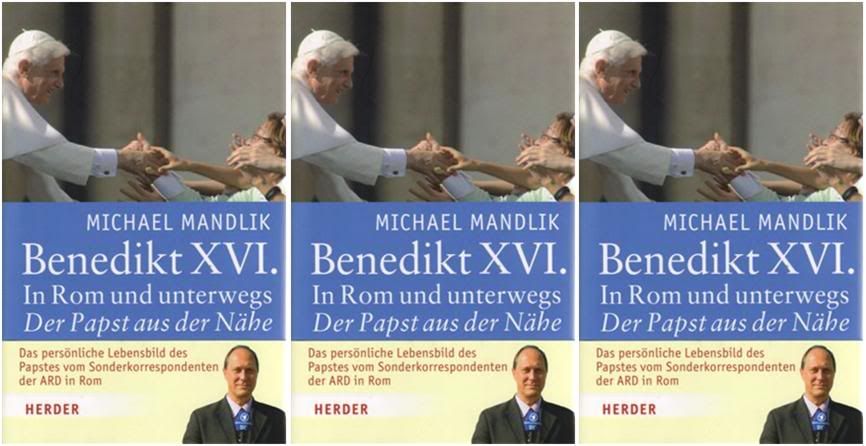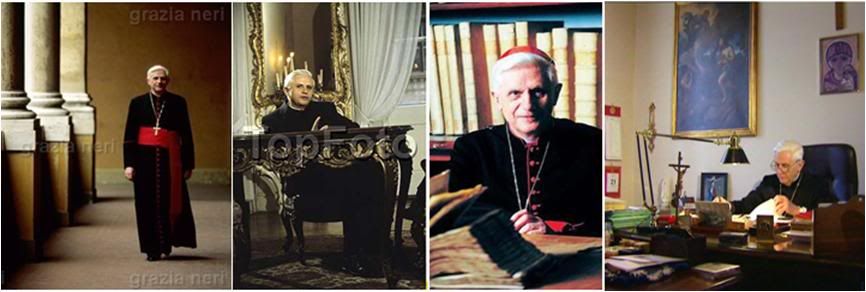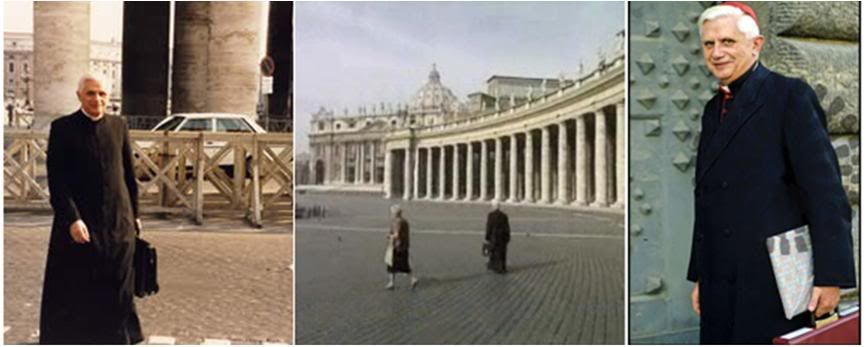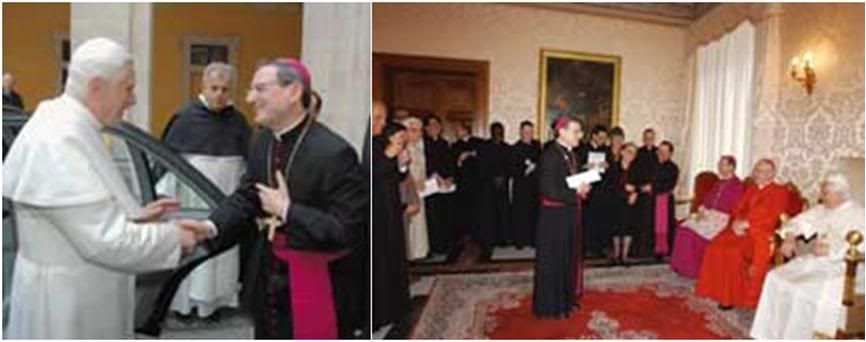| | | OFFLINE | | Post: 20.077
Post: 2.718 | Registrato il: 28/08/2005
Registrato il: 20/01/2009 | Administratore | Utente Veteran | |
|


 Last February [on Page 71 of this thread], I translated and posted excerpts from a 2009 book in German written for Herder, by the Vatican correspondent of Bayerischer Rundfunk (Bavarian radio and TV), Michael Mandlik, who has covered Joseph Ratzinger since 1995. In the book, he describes his coverage of him in Rome and during his apostolic journeys as Pope.
Last February [on Page 71 of this thread], I translated and posted excerpts from a 2009 book in German written for Herder, by the Vatican correspondent of Bayerischer Rundfunk (Bavarian radio and TV), Michael Mandlik, who has covered Joseph Ratzinger since 1995. In the book, he describes his coverage of him in Rome and during his apostolic journeys as Pope.
All thanks to Beatrice
 benoit-et-moi.fr/
and her friend Marie Anne Beaulieu, who is the Webmaster for the site of the Franciscan Custody of the Holy Land. They became friends during the Holy Father's pilgrimage to the Holy Land, when Beatrice made use of Marie-Anne's accounts on the site and on a collective blog in La Croix during the visit.
benoit-et-moi.fr/
and her friend Marie Anne Beaulieu, who is the Webmaster for the site of the Franciscan Custody of the Holy Land. They became friends during the Holy Father's pilgrimage to the Holy Land, when Beatrice made use of Marie-Anne's accounts on the site and on a collective blog in La Croix during the visit.
Marie-Anne has been passing on to Beatrice her 'summary' of the book, in French translation, chapter by chapter...

'Benedict in Rome and on the road: The Pope up close'
The first post was Chapter 1, where the author sets the stage for how he came to know Cardinal Ratzinger, and Chapter 2 - the first part of an interview which the cardinal gave him in 2002 to mark his 20 years as Prefect of the CDF. Felcitously, since Benedict XVI visited the CDF office today for the first time since the day after his election as Pope, I can post the full interview now, with a brief introduction by Marie-Anne...
RETROSPECTIVE:
Interview with Cardinal Ratzinger
on marking 20 years as CDF head

In 2002, to commemorate his 20 years as Prefect of the CDF, Cardinal Ratzinger gave Mandlik an interview for Bavarian TV. When one reads today what the cardinal said about his activities and convictions at the time, one finds a coincidence with the axis of the Pontificate he would commence three years later.
How would you describe your collaboration with John Paul II?
I would distinguish three types of meetings with him. First, group meetings when other cardinals and myself would sit with him for work - usually about an hour long. Then our Tuesday dinners which were more relaxed; and finally, my Friday meetings with him as Prefect. That is when I try to present various files to him, underlining various points of view about a question so that he could make a decision based on knowledge of the facts. Before and after these sessions, we find some time to talk about things of mutual interest, like the trip that he is preparing to take or that he has just made.
How would you assess the past 20 years - what is the proportion between the problems and the joys that your mission brings?
It is a mixture of both, certainly, and that's normal. But first, there is the joy of being in touch with practically the whole world - with the bishops who come to Rome every 5 years in successive turns for their ad limina visits. This allows us to take part in their pastoral experiences, to create close and cordial bonds and even friendships. And thanks to the lay faithful, to representatives of the worlds of politics and science who come to meet with us, we get to take part in the great events of our time, and to some degree, in the important decisions.
It is also very beautiful to feel the confidence of so many persons, particularly of our young collaborators, evne if they leave as soon as they have received the training they came for, giving way to others.
Besides all this, one cannot overlook the problems, the anxiety over whether our work is truly able to help. And one cannot be indifferent to being called Panzerkardinal... But it is also true that one cannot deal with important matters without having to undergo some form of insult....
For someone to reach where you have, one presumes a preparation that goes back to your origins, with your parents and your siblings...
Yes, to a very great measure. My parents had different temperaments which were complementary. Our father had the gift of reasoning with extraordinary clarity, and he was big-hearted in his judgments. He transmitted to us his serious and profound faith, while our mother showed us a warm faith that was not less demanding. She had a poetic soul, an affectionate heart, and she understood things intuitively.
This familial atmosphere marked us for life. My older brother then showed me the way that I would follow myself; and my sister with her humble faith, and her constant self-effacing availability, was always there to help me find the right solutions.
Thus, my family represented for me not simply the 'stem cell' of my origins, but also the driving force for the course I chose.
What was your work like here, at the CDF, in the past 20 years?
There was always a little of everything. It's a fulltime job - 36 hours a week, and then what one must do at home to finish up some things. Then, there are the emergencies, as there are in the life of the Church, and in the world as it concerns us. One must answer to many questions and requests with very few personnel. But one tries not to be submerged by the present, and instead, to set the stage for the future...
Among the many questions that the CDF had to deal with in the past 20 years, there is one that must be mentioned - which is, liberation theology. In the opinion of some, it almost tore the Church apart in the context of the East-West conflict. But now, no one speaks of it anymore. What do you think?
It is perhaps exaggerated to speak of a tearing apart, but it is true that it represented a great challenge. In effect, some theologians and pastors in Latin America sought to deal with concrete problems by using the faith as a factor that they thought could be immediately effective in resolving them.
Initially, it did not seem dangerous, but then, the faith was instrumentalized, becoming nothing but a pure and simple political force through which poverty was to be conquered, as in Marxism. The redemption obtained from God became subordinate to political activity that could effect a 'liberation'. So it became necessary to react vigorously in order to prevent the politicization of the Church.
Another mammoth subject as the Catechism of the Catholic Church, which you were in charge of compiling and publishing. Even if one just flipped through its pages to look for a specific reference, it is clear what an immense amount of work it must have required.
Yes, it was difficult to get started. But I must pay tribute to Mons. [Alberto] Bovone, who was the secretary of the Congregation at the time, and whose advice to me was very valuable. [Mons. Tarcisio Bertone took the place of Bovone after the latter was named by John Paul II to the Congregation for the Causes of Sainthood.]
We started by constituting a committee representing all the bishops of the world in their diversity as to theological sensibility and catechetical orientation. After numerous discussions, we agreed on an outline for the book. What would be the guiding thread? Where would we start? With the question of the existence of God? Or would we present the faith with its power of persuasion as an organic whole? Etc.
The first draft was in Latin which we sent to all the bishops of the world. Then we chose an editorial committee with 7-8 members representing all Christianity. The 'definitive' text took shape after numerous back-and-forth exchanges between this committee and the bishops.
It was a beautiful and enriching experience for all who worked together on it. It was very impressive to observe how so many opinions which were so diverse finally converged into one whole presentation. Of course, like any human product, it has its defects and can always be improved. But I think the vast project was well worth the effort, and the result is an offering to Christianity.
How must one use the Catechism of the Catholic Church? Is it a dictionary which allows for interpretation, or should oen consider it like the Bible?
As it is with the Bible, one cannot isolate sentences outside their context but they must be situated within the entirety of the book. This Catechism expresses all the faith of the living Church. We have therefore anticipated a corrected edition that will take into account a number of comments received after the first edition.
In Germany, certain topics stir up discussion about the view from Rome, for example on priestly celibacy, on sexual morality, or the ordination of women. Sometimes one has the impression of going around in circles. Why does the Catholic Church not follow the path traced out by Lutherans, Anglicans and other evangelicals in this respect? Then you would have the approval of the media and there would be less controversy...
Satisfying public opinion, certainly, but the discussion will go on until the threat of schism. It's what's taking place before our eyes among the Anglicans, where there is starting to be a movement to convert to the Catholic Church after leaving the Episcopalians.
[He was talking about this already in 2002!]
The Church cannot do what it 'wants'. The question is to know what is the mission of the Church. If faith were nothing more than the decisions taken by some old men in Rome, it would be too little. At this moment, I can ask myself: What interest can there be in going with them? Why must we do what they say? The next generation could very well decide something else!
If faith does not rest in God, who precedes us and comes towards us, then it is not worth believing in anything. Faith is not at our disposition. The question that we should always ask ourselves is this: What is the task that the Lord has entrusted to us?
The Pope is not an absolute monarch. He must always listen [to what God says]. I know that, humanly it would so much easier for him to allow the ordination of women, but he chooses to follow the current of the Church's great living tradition, faithful to the faith of the Church. What makes faith precious is that one can rely on it, in life and in death.
When you published DOMINUS IESUS in 2000, the document aroused a wave of protests which later subsided. What did you think? Was it all a misunderstanding?
Of course. Especially since many persons who criticized it never even read it. An internationally famous professor wrote me, for example, that after having read the newspaper reports, he did not have to read the text itself...
Now, what the text says is that our desire for unity does not mean we should agree on the least common denominator while neglecting the more important points - because that would mean a loss of our Catholic identity. Christian unity will be a polyphony where each part will have its place, all the while respecting the others, in order to advance together on the same path.
And afterwards, were there also positive reactions?
Yes, gradually, we started receiving letters of encouragement, with less hasty reactions, even if their viewpoints were different.
For example, for the followers of the Indian religions, it is difficult to admit that God became man in Christ, which would mean that Christ is greater than the figures who represent the other great religions.
With the Orthodox, we share the idea of episcopate based on sacrament since the beginnings of Christianity. But the Protestants use the Word of God as the starting point, and so they have a different viewpoint for considering the hierarchy of the Church. But all this can and must be discussed with mutual respect.
How do you see the relationship among the great religions at this time? Can we imagine a religion that transcends frontiers and peoples, thanks to which we can all belieeve in a common God?
I think that the concept of God is very different among the religions. Take Buddhism, for example, where one cannot think of God in the sense of a person, as in the monotheistic religions. On the contrary, the children of Abraham all have the same idea of a Creator God that binds us to each other. So even if we have enormous differences, we can 'walk together'.
I don't think that ultimately it will be possible to blend all the religions into one, but rather that they should enrich each other mutually. As the Pope said recently, as long as the Name of God remains the God of peace, and that religion is not spread through violence but by the power of Love.
Can one oppose progress in technology to religion? And will religion be overcome by science?
But they have to do with two different planes. On the part of science, one must always ask - what is useful and what is harmful. That is, the ethical norm is the utility of obtained results. Otherwise, instead of constructing, one ends by destroying the work of the Creator.
On the other hand, religion is concerned about man's ultimate end, his dignity - and this is beyond experimental determination. We must learn to consider these two levels as complementary. A religion without reason would be as harmful to humanity as science which completely discards the criterion of religion. It is only this way that we can answer the essential questions, "Who am I? What should I do?"
Is it not dangerous for the Church that scientists are capable of demystifying God in the name of progress?
True, but nonetheless, man continues to feel the need for God, especially in questions of life and death. Think of Pascal, for whom man was no more than a reed, but a thinking reed! Situated in the midst of the universe, at the intersection of the microcosmos and the macrocosmos, man must ask questions about himself, his end, about love and suffering, in order to know that his existence is worth far more than all the calculations of probability in the universe.
What about research in the field of genetics in order to cure heredeitary diseases, and then cloning? Do not all these things lead to a demystification of the divine?
Of course, to a certain degree one can manipulate human beings. But man knows he is not a product of technology - that he is the result of a unique thought by the Creator God - therefore a unique being, with his own sufferings and joys, his need to love and be loved.
That is why we insist on the unique character of each person, and on his dignity, so that he may not be exposed to abuse by science, so that he may not be debased by something which should serve to promote him. I am thinking specifically of the eugenics practised during the Third Reich in such cruel ways.
What do you think of the current situation of the Catholic Church in Germany?
I must express myself with nuance. Since Germany is in western Europe, it has suffered the same decline in terms of religious practice and vocations. People see in Jesus a grat man and nothing more - and therefore, he can be criticized, like the whole Church, which is considered 'reactionary', having a past that included the Inquisition... And all this makes it more difficult for believers. Moreover, the situation of the family has changed - it is no longer considered as the basic cell of society. So raising children is also more difficult.
In Germany, there is a great potential in terms of the economy, but not as much in terms of faith. And yet, there is, in young people, an authentic desire to believe, with simplicity, and with joy. The rancours of the 1960s have disappeared. They now have the desire to draw from faith the power to create something great.
As I first said 30, 40 years ago, the Church will be in the minority, but it will have a new internal vigor so that it can once again be 'salt of the earth and light for the world'.
The Church is not in decline, it is going through a crisis in order to renew itself in all ways, so that it can be better situated in society in a way that it can bring it new vigor.
After 20 years at the head of the Congregation for the Doctrine of the Faith, is there something you would have done differently if you could start all over?
I think I can say No. With age, one mellows, one slows down - that is true. But as for the major decisions, they remain valid, especially since they were taken in consultation with experts, with the cardinals of the Church, and of course, the Pope. So personally, I would not do anything different if I had to do it all over.
Do you ever get angry with yourself?
Oh yes! When I cannot find papers that I have set aside and I lose time looking for them! Or whenever I think that I will not be able to meet a deadline for a specific task. Alas, I do not lack for occasions to be impatient with myself....
What is the most beautiful memory that you have as Prefect?
It is not an event that I will cite. The most beautiful thing for me, is St. Peter's Square, which I must walk across twice a day - it's there were I meet people who recognize me and say, "I read your book, and I am following what you say..." And then there are people who just walk up to me to express their good wishes, their recognition, in a way that makes me feel I have brothers and sisters around the world. This encourages me, and makes my work not just bearable but important and beautiful!


You are not just German, you are Bavarian. After 20 years away from Bavaria, what remains with you as unforgettable?
I don't feel separation from Bavaria, because it is profoundly anchored in me. The Bavarian character has blended with the Roman. Moreover, throughout history, Munich and Rome exchanged so much that Italians can say, "Oh Munich, it is like being in Italy!"
And of course, you can never forget what you experineced in your infancy and early years. Our roots continue to live in us.
 Pope Benedict XVI paid a surprise visit to the CDF the day after his election as Pope. Left, he is welcomed by Mons. Angelo Amato, then CDF secretary,
Pope Benedict XVI paid a surprise visit to the CDF the day after his election as Pope. Left, he is welcomed by Mons. Angelo Amato, then CDF secretary,
now Prefect of the Congregation for the Causes of Saints; and Fr. Augustine Di Noia, now secretary of the Congregation for Divine Worship.
Benedict XVI revisits the CDF
for the first time since 2005
Translated from

April 30, 2010
Pope Benedict today returned to 'his' former dicastery, the Congregation for the Doctrine of the Faith, which he led from February 1982 to April 2005.
Arriving around 6 p.m. at the Palazzo Sant'Uffizio, across St. Peter's Square from the Apostolic Palace, he was welcomed by Cardinal William Levada, whom he named to succced him as Prefect; Mons. Luis Ladaria Ferrer, secretary; and Mons. Damiano Caotorta, sub-secretary.
The Pope proceeded to the chapel of the dicastery for a brief adoration of the Blessed Sacrament. After welcome from Cardinal Levada, the Holy Father presided at the liturgy for the benediction of the new chapel, which has recently been restored. [Appropriately, the blessing is on the feast day of St. Pius V, patron saint of the CDF.]
The Holy Father then visited the new location of the Archives and the offices of the Pontifical Commission Ecclesia Dei, now attached to the CDF. This is where the Commission led by its secretary, Mons. Guido Pozzo, has been holding doctrinal discussions with theologians of the FSSPX. Three sessions have been held since last October.
Finally, the Pope proceeded to the conference room to greet the rest of the staff.
[Modificato da TERESA BENEDETTA 30/04/2011 14:04] |